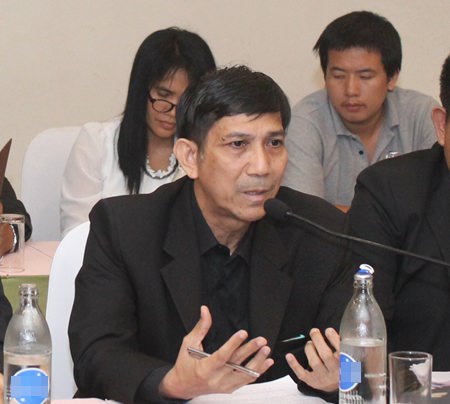
Pattaya business leaders were briefed on the details of a recently announced – and quickly suspended – labor law aimed at upping the penalties for employers hiring illegal aliens and trafficking workers.
Sutham Buakow, director of the Chonburi Provincial Employment Office, spoke July 12 to the Pattaya Business & Tourism Association at its Green Park Hotel.
The Royal Decree on the Recruitment of Foreigners was published in the Royal Gazette June 22 and came into force a day later. On July 4, Prime Minister Prayut Chan-o-cha suspended enforcement of most of the law for six months using Section 44 of the interim constitution.
Small- and medium-sized companies across the country went into an uproar in the last week of June, with many sectors thrown into chaos due to fear and ignorance of the strict new labor law, which was hastily rushed through the cabinet and enacted as a royal decree, instead of being debated by the National Legislative Assembly.
By July 1, hundreds of migrant workers were abandoned by employers who feared being hit with new fines under a law they didn’t understand. Thousands more fled Thailand for Cambodia, Laos and Myanmar fearing arrest, at the same time shutting down construction sites and factories across the country.
Hoping to clear up some of the confusion, Sutham came to the PBTA meeting to outline exactly the new labor regulations do.
The law aims to both crack down on human trafficking of migrant workers and protect occupations reserved for Thai nationals from illegal aliens. It stipulates harsher punishments for both civil and criminal violations, with fines against companies ranging from 400,000-800,000 baht.
Sutham pointed out that, unlike in the past, fines are determined by the number of illegal workers found. Thus a company that employs one foreigner without a work permit would not be penalized as much as a factory full of illegals.
The fine for filling a job reserved for Thais with a foreigner would be 400,000 baht.
However, employers need not worry about any fines until Jan. 1 following Prayut’s Section 44 order. Sections 101, 102, 119 and 122 of the decree covering punishments levied against employers and any of their unregistered workers were delayed for 180 days to give all sides more time to adjust.
Human rights groups warned, however, that corrupt police and immigration officials would try to extort and exploit foreigners and companies unaware of the suspension of penalties.
Poor migrant workers from Thailand’s neighbors are most at risk, with the new law specifying fines of up to 100,000 baht and prison sentences of up to five years for residing and working illegally in Thailand.
The penalties for human trafficking cases, however, were not suspended, Sutham explained.
Any employer or employment agency that impounds work permits or travel documents of an alien laborer faces up to six months in jail and a fine of up to 100,000 baht.
Traffickers found guilty of recruiting workers for exploitation can spend a decade in prison and face million-baht fines. Unregistered agencies also face fines of up to 600,000 and three years in jail.
Sutham also outlined the 39 professions that are reserved for Thais, unless a waiver is granted. These include retail clerks, hairdressers, silk weavers, architects, sculptors, tour guides, accountants, farmers and secretaries.




